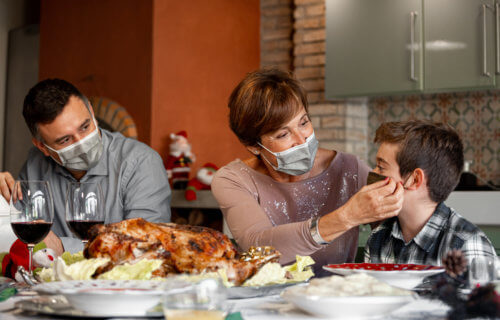BOULDER, Colo. — Is the viral carousel the world has been riding since 2020 ever going to stop? While the COVID-19 pandemic has shown some signs of slowing down, a new viral problem has appeared on the scene just in time to complicate yet another holiday season. A “tripledemic” of respiratory viruses consisting of COVID-19, RSV (respiratory syncytial virus), and influenza has been surging in many parts of the country.
Due to the presence of not one, not two, but three viral risk factors this holiday season, many Americans are facing a tough choice. Should you attend Thanksgiving if you wake up with the sniffles, or should your child attend school even though they were coughing the night before?
Imagine a friend calls and says they had just tested positive for COVID-19 — should you start wearing a mask in public again for the next few days?
Questions like these can be anxiety-inducing and stressful, but researchers from University of Colorado Boulder report that, in most cases, just a moment or two of honest self-reflection can point you towards the right decision. Simply taking a moment to reflect on the consequences of one’s own actions usually leads to choosing an option that imposes fewer risks on other people.
Notably, this project also reports that on an almost universal basis people valued the health and well-being of others. The study featured 13,000 participants.
“Most people aspire to behave in a way that considers others’ wellbeing but often, in the moment, they behave more selfishly than they aspire to,” says senior study author Leaf Van Boven, a professor of psychology and neuroscience at CU Boulder, in a university release. “Our lab is trying to devise ways to help people better align their in-the-moment behavior with their values.”
Most people consider others when it comes to illness
Study authors conducted this project at the height of the pandemic. Prof. Van Boven and collaborators in London, Austria, Singapore, Israel, Italy, and Sweden presented volunteers residing in all of those countries and the U.S. with three distinct hypothetical scenarios:
- They owned a small restaurant and were considering reducing capacity as the virus surged.
- They were planning on meeting with 50 friends for a birthday party for the first time after months of isolation, but the local government recently announced COVID cases are surging once again and gatherings of more than 10 people aren’t a good idea.
- They were deliberating whether or not to cancel a planned Thanksgiving celebration with 30 family members that would include both older adults and young kids.
Before making a decision regarding any of those hypothetical scenarios, half of the study participants were asked to pause and practice a technique called “structured reflection,” that had been developed by Van Boven’s lab. This technique is all about helping people be more mindful of their own values.
Participants had to ask themselves two big questions: How will my decision impact me personally? Also, will my decision impact public health? For example, for the Thanksgiving scenario, they asked: “How much (on a scale of 1 to 7) should your decision be influenced by the likelihood that COVID-19 may spread among family members?” and “How much should your decision be influenced by your satisfaction of spending time with family members?”
Across all considered countries, cultures, ages, and political parties, one important observation remained the same. Almost every person placed at least equal weight on the well-being of others.
“That’s encouraging,” Prof. Van Boven adds. “Our study and others suggest it is a universal human tendency that people believe they should care about how their behavior affects other people.”
Personal responsibility taking center stage in post-COVID era
Participants assigned to the structured reflection group were significantly more likely to say they would probably cancel Thanksgiving. Similarly, in other scenarios they were also more likely to err on the side of caution and the minimization of public health risks. According to Prof. Van Boven, these techniques may help countless people make more responsible public health decisions when faced with a choice between two options.
“People know that they should not text while driving, that it’s better for the planet if they take the bus instead of drive, that they should eat more vegetables and exercise, but knowing is only the first step,” Prof. Van Boven notes.
Typical public health campaigns usually aim to change people’s minds, but Prof. Van Boven believes this work illustrates a different way to promote responsible public health behavior — helping people become their best selves and make what they already know is the right and more responsible decision. As COVID-19 restrictions continue to fade away all over the world, personal responsibility will become increasingly important, according to Prof. Van Boven.
“I would encourage everyone to develop a habit of asking themselves when they are considering any sort of large social gathering: What is the risk you might impose on other people and is the benefit of the gathering worth the risk?”
The study is published in PNAS Nexus.

